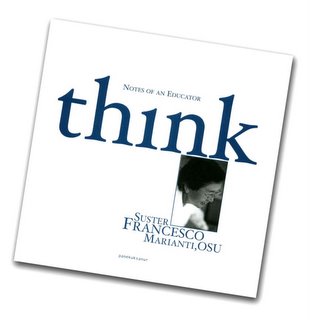
The Jakarta Post
Sunday, 18 December 2005
BOOKMARK
Think: Notes of an Educator
Sr. Francesco Marianti
Panekuksanur, December 2005
206 pp.
Thang D. Nguyen, Contributor, Jakarta
The French mathematician and philosopher Rene Descartes once uttered: "I think, therefore I am." In other words, thinking defines a person's existence.
This is the premise of Think: Notes of an Educator, the memoirs of Sister Francesco Marianti -- a Catholic nun and one of Indonesia's most respected educators -- which was launched last week in its English version.
In 1974, shortly after Sr. Francesco took up her post as the principal of her alma mater, Jakarta's Santa Ursula High School, some of her students gave her a gift: a wooden board with the word Fikir, or think, on it. They did this because the question she often asked her students was: "Have you thought about it carefully?"
But the most important question for Sr. Francesco has been, and still is: "How can I make my students think?"
Sr. Francesco believes that this is the ultimate responsibility of a teacher, and that education is not just about enhancing one's knowledge; rather, it is about learning how to think, to reason and to be a human being -- a free one, that is.
"The ability to think is God's gift to mankind," Sr. Francesco writes. "Thinking symbolizes the fundamental freedom of a human being, as predicted by favorite poet, Kahlil Gibran: You may chain my hands and shackle my feet/You may even throw me into a dark prison/But you shall not enslave my thinking/Because it is free."
Thus, whether it's science, writing, or otherwise, Sr. Francesco puts emphasis on training her students how to think critically and how to reason.
"Out of the four lessons I learned in this school, the word THINK is number one. Through Sister Francesco, I came to realize how powerful this word is. Thinking forces us to act in the right way. Thinking helps us to consider what is, or is not, appropriate behavior towards fellow human beings. Thinking helps us to be better human beings, to progress more than others," said Reda Gaudiamo, a Santa Ursula alumnus and deputy editor-in-chief of Cosmopolitan magazine.
But Sr. Francesco's does more than teach; she touches lives, those of her students and of many others who have come to know her. As a nun and principal of Santa Ursula -- whose motto is Serviam (I serve) -- she has reached out to the poor, the sick and the weak.
While she may not have food, water, or clothes to give them, she speaks for them so they can be heard, and is with them in their hour of need, whether it is a campaign on violence against women and children at the Hotel Indonesia roundabout, a trip to Aceh, Timor Leste or Kalimantan to help victims of conflicts or a sabbatical to places as far as Calcutta, India, to help unfortunate villagers.
What is most touching in this book, however, is the story of how Francesco Marianti, originally a non-believer, followed her calling to become a nun.
While studying at Santa Ursula, then 15-year-old Francesco Marianti asked her father for his permission to convert to Catholicism.
"After you're baptized, be a Catholic 100 percent. Not halfway. If you are not able to do this, you'd better cancel your decision," he said.
But answering her calling two years later to become a nun -- instead of a doctor, as her parents wished -- didn't come easily.
"(My parents) were shocked, angry and finally refused to speak to me again," she writes.
Her parents also stopped providing for her senior year at Santa Ursula, but Francesco still managed to graduate. Next, with encouragement from her confessor, she enrolled in Engineering at the Bandung Institute of Technology (ITB) -- also against her parents' will.
While at ITB, she met a man, and four years later, they were to be married -- but this time, she had her parents' blessing.
For once, life seemed to be going smoothly, but then Francesco was diagnosed with lung disease and had to endure a life-threatening operation.
"God showed his power at the most depressing moment for my family. When I realized I was receiving the sacrament for the sick, I vaguely remembered my promise, to give myself 100 percent to the Lord. I don't know exactly what happened, but amidst all the confusion, I managed to say `I will, and You've got to take care of everything.' After that, I felt myself making a rapid recovery," she writes.
As though her lung operation was not enough to confirm her faith in and readiness for God, her fiance called off their wedding plans. With a broken heart, Francesco Marianti headed for the convent to fulfill her calling.
Francesco tells her life as a Catholic nun and an educator in a warm, gentle and honest way that allows a reader to listen, understand and empathize.
But most importantly, this book makes you think. Whatever your position, you will realize after reading this book that teaching others to think and therefore, to be, is not easy to do, whether at school, home, work or elsewhere.



